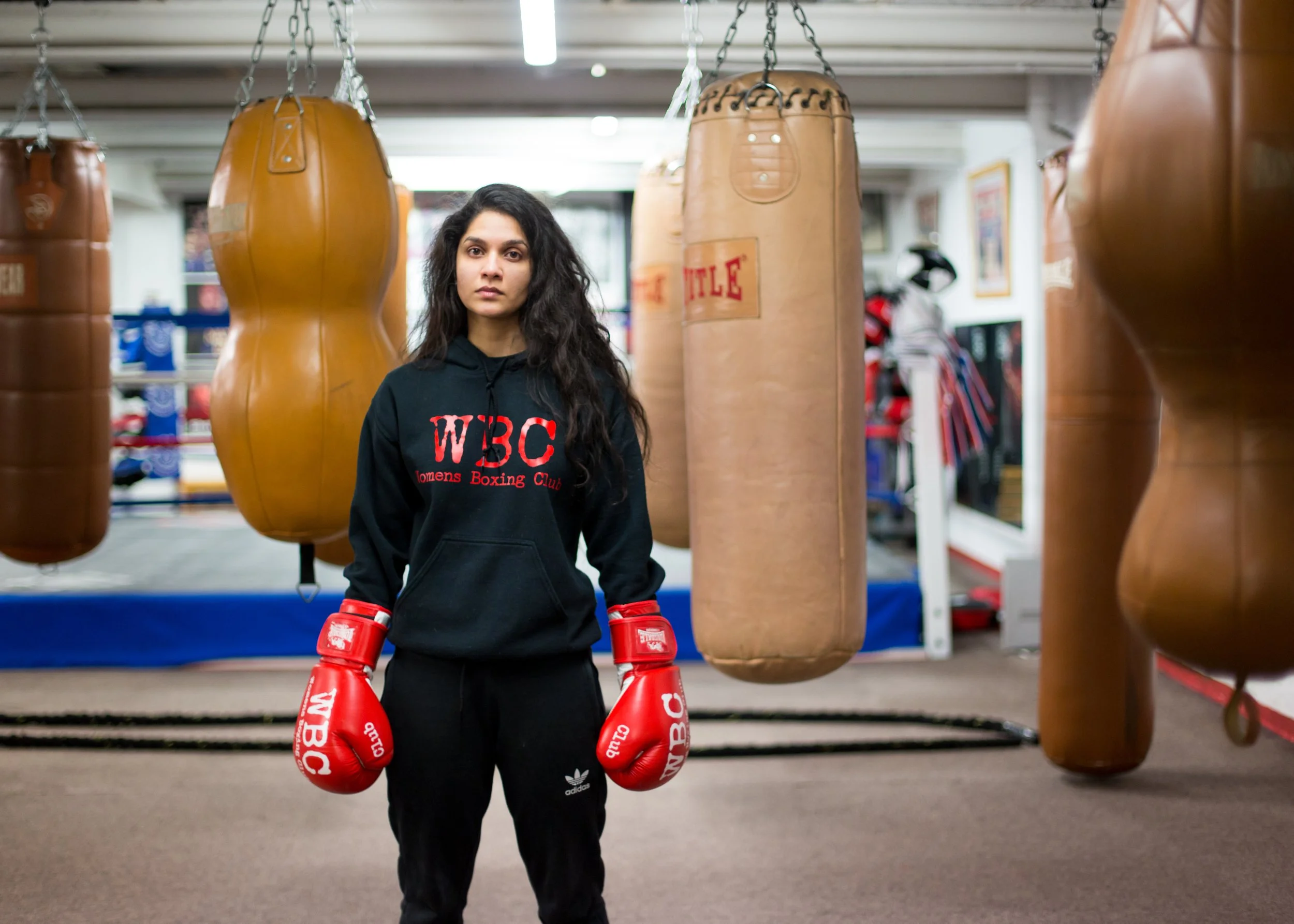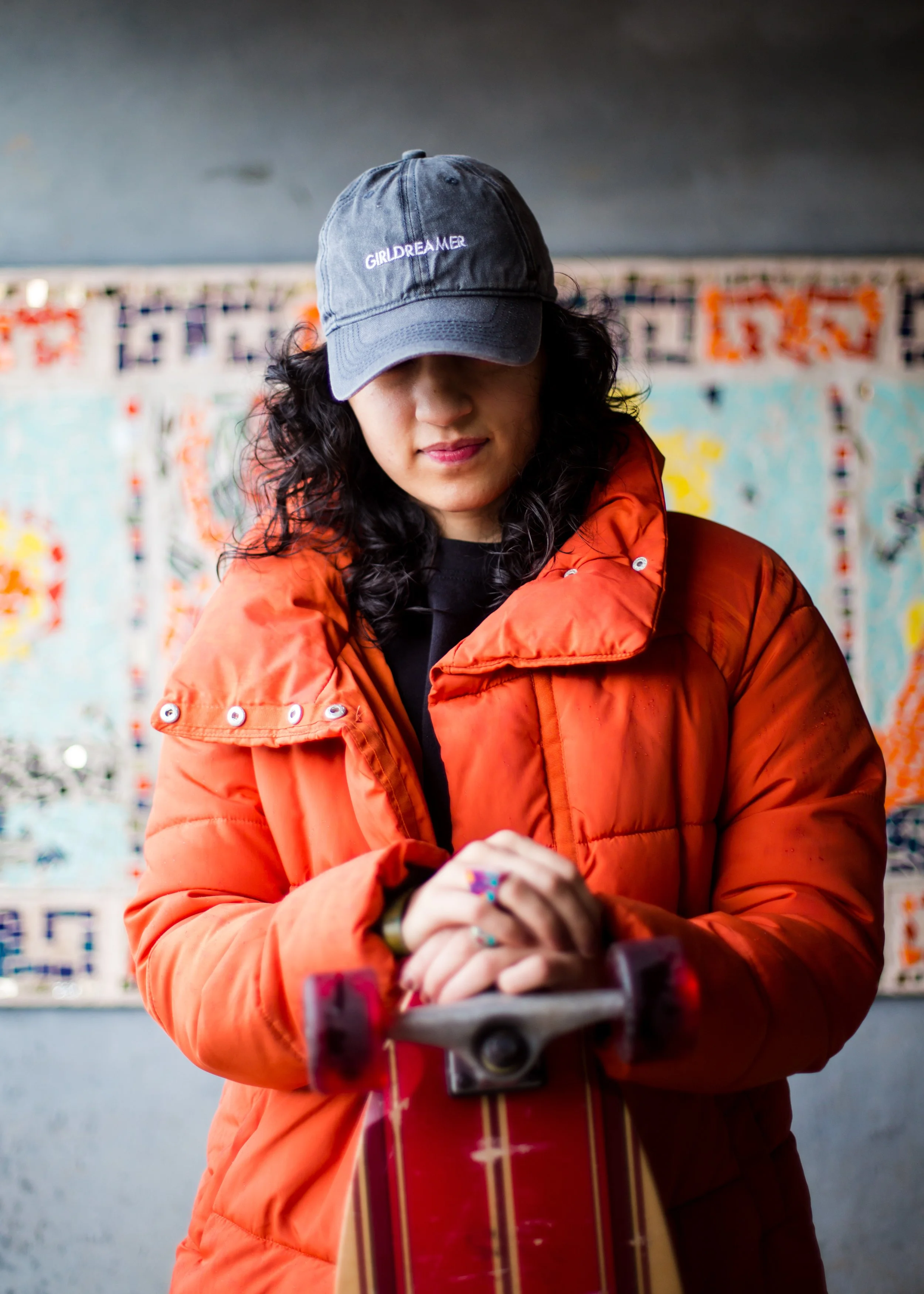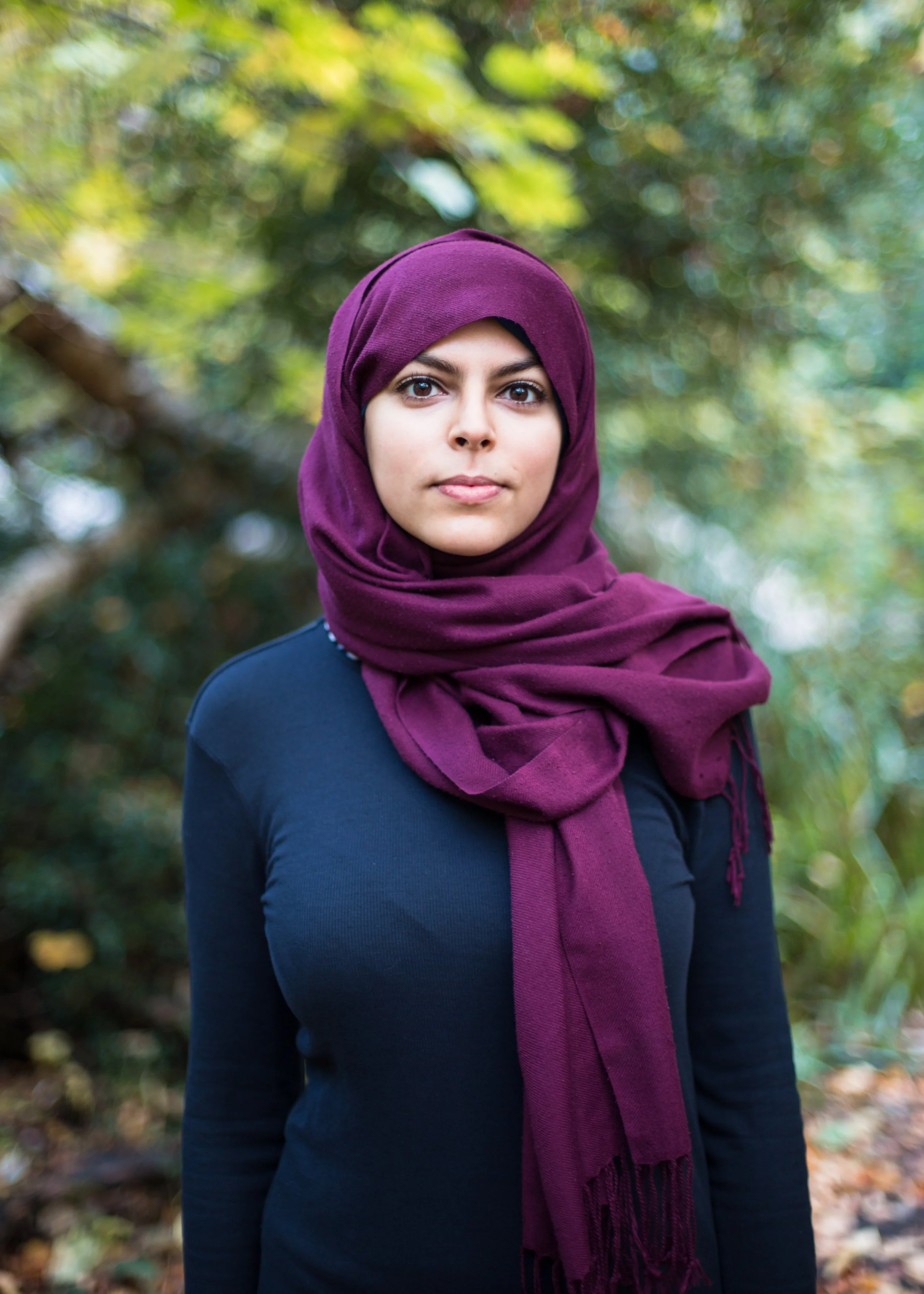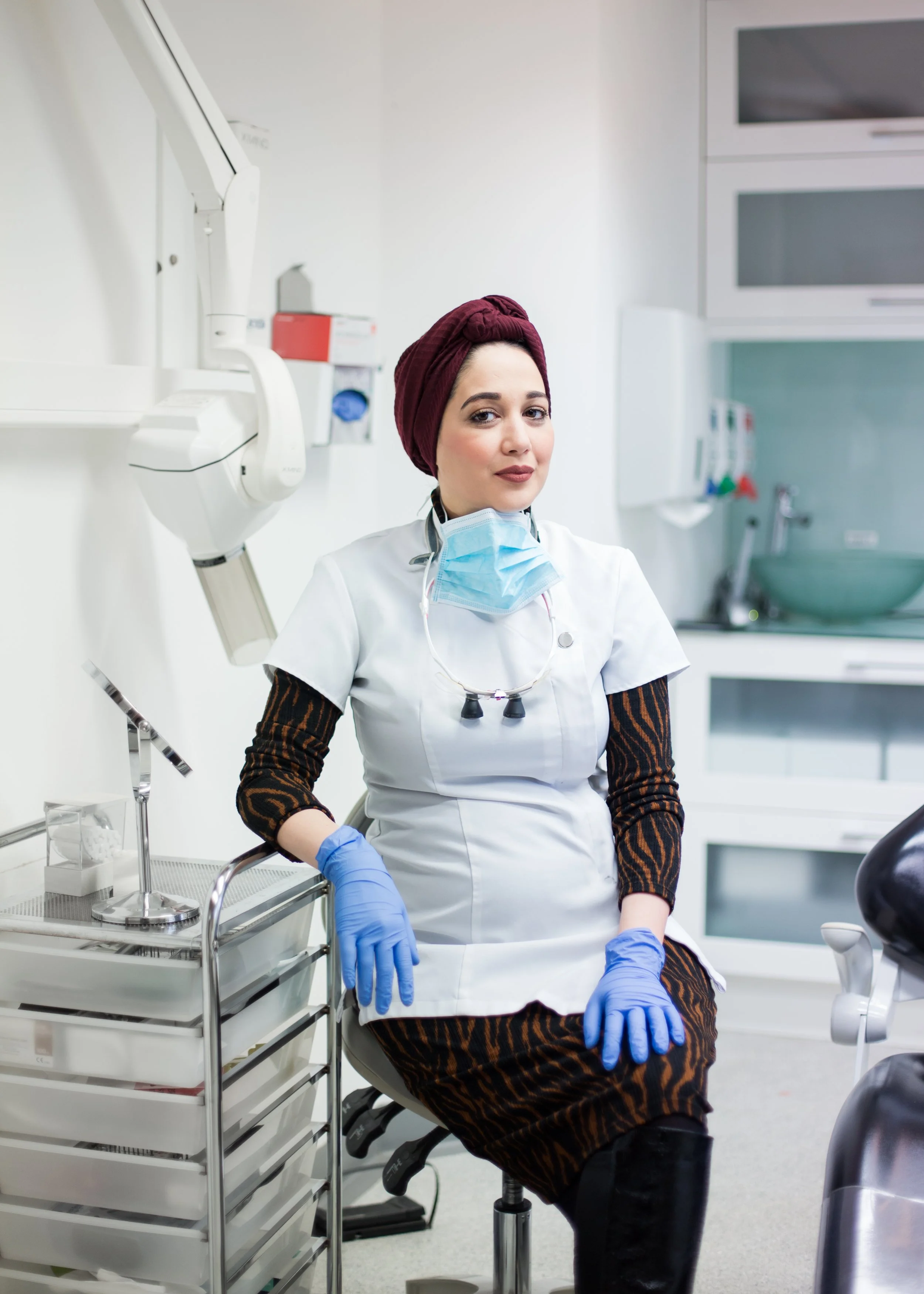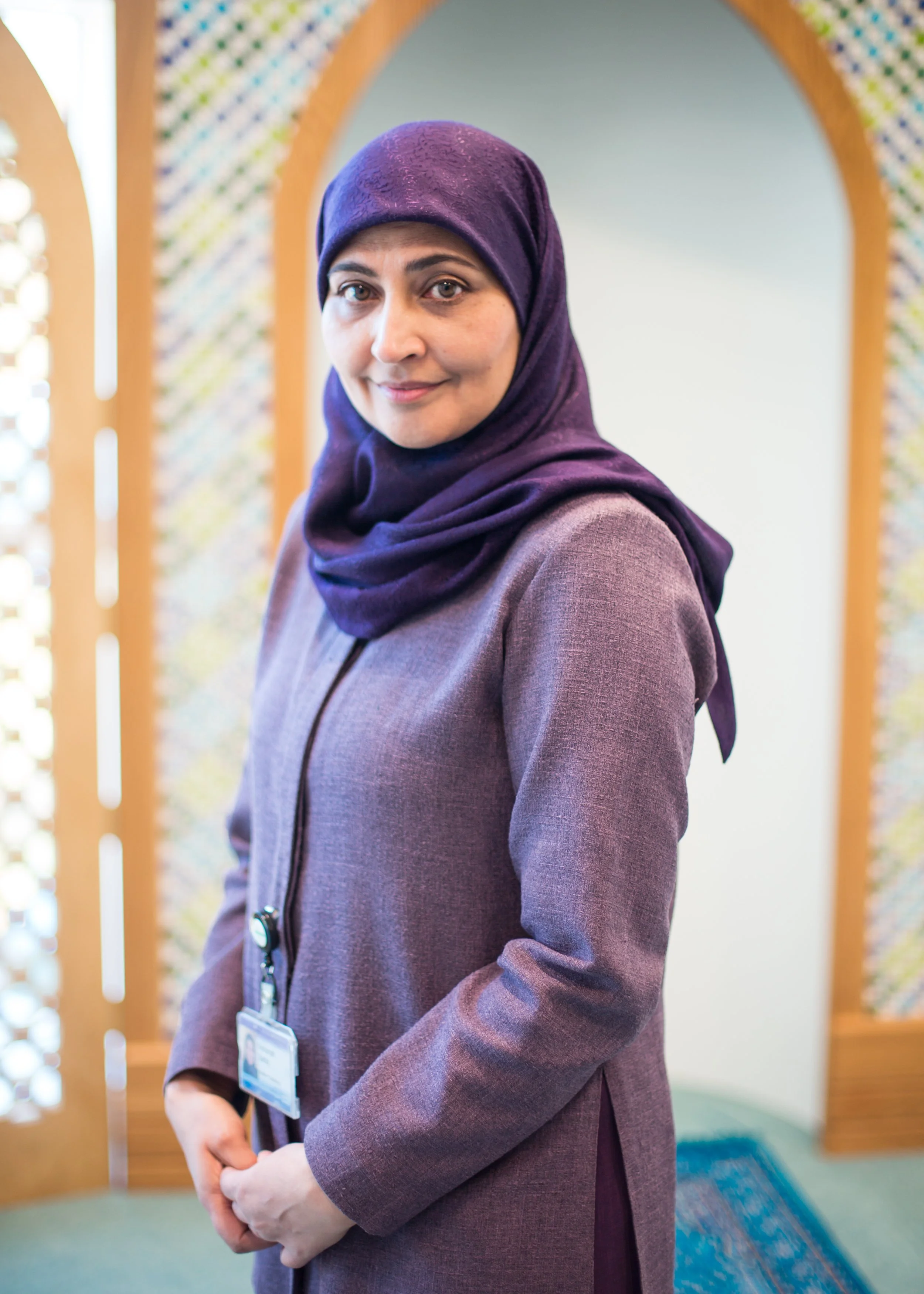Beyond Beliefs
Anisa Fazal is a Birmingham-based Documentary Photographer. Her series of photographs depict a diverse range of Muslim women from across Birmingham, portraying them as who they are; influential and empowering role models.
Anisa uses photography to challenge misconceptions about Muslim women and is showcasing the varied roles of women not only in Islam but also in society. Her work explores Feminism and Islam and how both can have different meanings for different people as well as questioning the perceived impossibility of marrying these two ideals.
Anisa explores the notion of the ‘Muslim Identity’ by working with a range of subjects in her work. By photographing each woman in her own space, Anisa wants her audience to aid recognition and identification. Being Muslim may be part of their identity, but it doesn’t define them.
Mav
“’How can you be Muslim, female and box?’ and ‘What do your parents say?’ are two questions that I get asked often…It doesn't matter what background you come from or what religion you follow, I want WBC (Women’s Boxing Club) to be inclusive for everyone. Who says an Asian, Female, Muslim girl can’t box?”
Mav is the co-owner of the ‘Women’s Boxing Club’ in Birmingham. One of the reasons she was passionate about this venture is because there was nothing out there for women. She wanted to set up a safe space as it is often daunting to box in a male-dominated environment.
“Being a Muslim is my identity. It is who I am. It reflects not only my religion but also my actions and character as a person. It is most definitely the biggest part of me.”
One of Mav’s biggest dreams is for WBC to continue to grow. Breaking barriers for every woman out there who wants to get involved in something new or do something out of her comfort zone. She wants to promote women in sport and encourage and motivate more women to get involved. “Who says high heels and a left hook are contradictory?”
Sabena
“The roles chose me. By that, I mean I followed my interests and passions for healing, personalized patient care, and love of people. This is in addition to my passion for education and learning, knowing that it can change the world by influencing and shaping minds.”
Sabena is a GP, Associate Dean for GP Education, and a final year PhD student looking at Medical Practical Wisdom (Phronesis). She is also a mother of three.
She comes from a long lineage of doctors which includes her Nana and Dadas (both grandfathers). In this photograph, Sabena holds a medical dictionary that has been passed down to her. The book has been signed by her oldest paternal uncle (Hafeez), her paternal aunt (Zamruth), her father (Jameel), and herself.
Sabena talked about the difficulties associated with identifying as a Muslim. “Overall, the fear of the challenging experiences is far worse than the reality. I have often felt support and kindness from Muslims and Non-Muslims for being visibly Muslim. I only started wearing hijab 17 years ago when I was 29. I wore it after 9/11 when my peaceful religion was hijacked. I am proud of my hijab.”
Sabena was photographed in her lounge at home. “It is an old Victorian townhouse in Moseley, very British. The décor resembles a Middle Eastern Bedouin tent. The combination is a bit like me,” she says.
Shaheen
“As a teenager, I was working towards becoming a fashion designer, but as a Muslim woman I was considered an outsider and this was all before I started wearing any head covering! I needed to find a way to get my point of view across and so I took up an Art Degree.”
Shaheen was photographed in her studio in Balsall Heath. She has been working as an Artist for 20 years and uses maps, threads and geometry in her work. Her practice is concerned with climate migration, displacement and global suffering of women, children and animals. Married with two children and born in Burnley Lancashire, Shaheen is of Pakistani heritage.
“I feel a great buzz of excitement when I am creating art in my studio. I lose myself in concentration and stop for prayer breaks to keep a balance within my day.”
One of Shaheen’s favourite sayings was the advice given to her as a child, by her father; ‘You never know who you will need tomorrow; breaking ties is easy but building relations is a skill’.
Nayera
“I work with people from many different nationalities, cultures and across different time zones. In any given day, I'll talk to someone in Iceland, Lima and Hong Kong...”
Nayera is a 33-year-old chartered civil engineer. She currently works in business development for a large engineering company. Her role entails bidding for airport design projects across the UK, Middle East, Europe and Africa.
Travelling is part of Nayera’s regular working week. She has taken over 300 flights in her life so far! “I bought a flowery suitcase so it was easier for me to spot on the carousel and easier to describe when it gets lost!”
“I really enjoy what I do and I am very invested in my career. As a young, Muslim, female and Asian engineer, it is a challenge to justify my position. All of the things that define me are outside of the norm for my industry, and despite dealing with ageism and sexism, I'm using my identity to catapult my success.”
Nayera was photographed at Grand Central train station in the city centre of Birmingham.
“I spend a lot of my time on trains and planes. Grand Central is a focal point of Birmingham and somewhere I spend a lot of time running from one place to the next!”
“Birmingham is home. No matter where I travel or live, Birmingham is always the place I know best and feel safe.”
Amna (middle)
“I've been an advocate for women's rights for as long as I can remember. I wanted to wake up every day knowing I'm making a difference in women’s lives. I wanted to create something unique of my own. Something that utilised my lived experiences and personal areas of growth in a society I knew I could impact.”
Amna is the co-founder of Girl Dreamer, an organisation that empowers young, millennial women of colour to realise and unleash their potential through leadership development, adventure sports and digital skills.
Through Girl Dreamer, Amna set up the UK’s first women of colour longboarding crew, ‘Boarders Without Borders’. A documentary was also produced about the project and won Best Short Film 2018 and Audience Choice Award 2018 at the Shextreme Film Festival.
Amna’s proudest accomplishment is becoming a TEDx speaker. “I've watched TED talks for as long as I can remember, so when the time came to stand on my very own red circle with the letters TEDx behind me, it was a really proud moment.
“I want people to view Muslim women as women that do anything. We are very much a part of society. I want to be perceived as a woman who isn’t afraid to go after her dreams. A fighter, a doer, a dreamer.”
One of Amna’s favourite quotes is by Frederick Douglass, who said, 'It is easier to build strong children than to repair broken adults.’
Amna is photographed with Malikah (left) and Milga (right). Malikah is a self-taught animator and illustrator. Milga is a mental health nurse, a poet and a calligraphist. Both girls are part of ‘Boarders Without Borders’. This photograph was taken in Cannon Hill Park where the longboarding community started in Birmingham.
Awo
“I am Somali by origin, Swedish by birth, British by culture, and Muslim by faith. I'm a black woman and I'm a storyteller. I am not one of them, because I am all of them.”
Awo is a journalist living and working in Birmingham. She chose this profession because she wanted to listen to and amplify the voices and stories of people we don’t often hear about. “It’s about understanding and learning from different perspectives as well as finding those hard-to-reach people to bring new angles into seemingly all too familiar narratives.”
“Nelson Mandela’s saying ‘Education is the most powerful weapon which you can use to change the world.’ is by far one of my favorites. It reminds me to always be of an open mind and heart. As a journalist, I’m constantly learning about people’s stories- their hopes, dreams and challenges. As much as people look to the media to be informed and educated on certain issues and stories, we too, as journalists are also, always learning.“
“I think it’s important to reflect how diverse women of faith are in their professions, but also in their backgrounds. There is no ‘one’ Muslim woman that represents all. The different versions of the Muslim woman, make the Muslim women of Britain today.”
Awo was photographed in the Library of Birmingham.
Nafeesa
‘’I’ve always been very creative and wanted to be a writer since I was young.”
Nafeesa is a 25-year-old British Pakistani Muslim poet and playwright based in Birmingham. Having recently produced a collection of her work, ‘Besharam’, meaning ‘Shameless’, Nafeesa’s writing explores themes such as domestic violence, mental health, identity and culture. Her words are inspired by both personal experiences and stories from other people.
“I struggled quite a bit whilst at university as I was one of a handful of Muslims on my Joint Honours course. Wearing hijab (head-covering) sometimes made approaching and talking to my peers quite difficult. I wanted to fit in but didn’t (nor do I ever) want to let go of my Muslim identity. It was challenging but strengthening.
As a performance poet, one of Nafeesa’s proudest moments was reaching the BBC Edinburgh Fringe Slam finals; her first slam competition. “Some of my biggest hopes and dreams are to make my family proud, to tour internationally, to win a poetry slam and to perform at the Nuyorican Poets Café (New York)”
Nafeesa was photographed at the Repertory Theatre (REP) in Birmingham. “I love theatre, I love the writing and the watching. I met Kate Tempest here for the first time. I want to see more people like myself in these spaces.”
Saima
“The water is every bit a part of me. I am the happiest and most content when on the water, especially at Gas Street Basin. The Basin is a hidden gem of tranquillity bang in the city centre.”
Saima is a gay woman of Pakistani descent who grew up in Small Heath. She is the owner and captain of ‘Boatel’ (a floating hotel), a narrowboat on the canal in the centre of Birmingham. When she first moved onto the water, she did raise a few eyebrows. “I would like to think this was less discrimination and more inquisitiveness. The boating world is very white and very male, so considering I was a single woman on a boat, who happened to be brown, I’m not sure the boaters knew what to make of me!”
“Having lived on the waters of Birmingham for about eight years, with the support of my water family, I’m still always disheartened with the lack of diversity within boaters and those who work on the water. It’s not reflective of the communities that actually inhabit Birmingham, most of whom simply don’t have the means of access to such things. With Boatel, I hope to actively diversify our canals and encourage more people of colour into roles on our waterways by creating apprenticeships and opening up a creative fund.”
“There are still people struggling to openly express their sexuality in the communities I belong to and think it’s very important to keep the conversation current and flowing. I’m very fortunate to have a lot of love and support from my family but this just isn’t the case for everyone.”
Saima was photographed at Gas Street Basin, Birmingham.
Aliyah
“My faith is my center, my compass, my essence. It guides me through my every day, challenges me as I grow and never fails to remind me it's the home I know deep, deep down in my marrow.”
Aliyah is a 22-year-old writer, poet and curator based in Birmingham.
“Of course, there have been anti-Muslim slurs and stupid comments made throughout my life by strangers and those won't stop until institutional racism is acknowledged. However, the biggest challenge would probably be my own perception of myself in a post 9/11 Western world. Institutional racism is a constant challenge in Britain, there's something even more violent when it's guised by white liberalism as progressive art or work. I'm focusing on not shrinking myself for white spaces but this is an everyday unlearning or decolonisation that I'm sure will span through the duration of my career.”
“I've always loved the work I've done but it's sometimes spread me thin and led to me neglecting myself and internalizing a lot of self-loathing. Getting out of that headspace and focusing on love being centered in everything I do is what I'm most proud of developing throughout my life.”
Aliyah was photographed at East Side Projects where she was commissioned to curate part of a group exhibition. “It sums up why being a black Muslim woman curating in Birmingham is possible. The ideas that are in my head can have space in the places I want them to.”
Sumaya
“I think we can only be our own role models.”
Sumaya is a writer and public speaker who enjoys researching history, philosophy and writing podcasts. She is of mixed heritage - Yemeni, Iraqi and English. Sumaya has given talks across the UK at various universities and art galleries as well as museums such as the V&A, Wellcome Collection and The British Library. She is also a Research Fellow (2019) for the Research Centre of Material Cultures at the Tropen Museum in Leiden, Netherlands.
Sumaya chose to be photographed at Moseley Bog in Birmingham because author and critic JRR Tolkien lived nearby and walked there. She explains the significance of this, “His fantasy novels have racial stereotypes that are still impacting the genre. As I also write in the fantasy mode, it amused me to think how he would react seeing a brown woman writer walking around this most English of locations. When I see Black and Asian kids running around here, it fills my heart with joy. All of us are here, claiming this land as our own, despite how the mainstream feel about us.”
“There are many Birminghams. Where I live, it's completely different from North Birmingham or East Birmingham. I live in the divide between Moseley and Balsall Heath and even between these two areas it's vastly different. I love how passionate people are about where they live. I wish the council managed the city better. There are real issues with developers buying up land without providing social housing.”
When asked how she would like to be perceived, she said, “I aspire not to care how I am perceived.”
Fatemah
“I want to be perceived as the girl who didn’t give up, despite my teacher in school and a lecturer in university thinking I couldn’t do it. The girl who proved people wrong.”
Fatemah is an animator and video film producer. She has a BA in Animation and another BA in Film studies. “Completing two degrees is probably my biggest accomplishment, despite being a person with special needs. The secondary school I attended didn’t even think I could achieve my GCSE’s, so they didn’t allow me to take them.” Fatemah has Asperger Syndrome and this has never stopped her from achieving her dreams.
“Birmingham is everything. It is my home. It is where I’ve grown up. I could never move cities, or even houses as a matter of fact, that’s how much I love it.”
Fatemah chose to be photographed at home because it’s where she feels the most safe; her sanctuary and the place she works on her animations. In her spare time, Fatemah loves to ride bikes, learn Arabic and practice the splits.
She loves to learn new things and challenge herself by setting herself goals. She uses a self-created bullet journal to stay focussed on things that are important to her.
Fatemah gains inspiration from the following quote by Lance Armstrong: “Pain is temporary. Quitting lasts forever.”
Yasmin
“Being a Muslim isn’t just an identity or a term but something which may vary from person to person. For me, it is a cause. The cause of being ethical and polite. The cause of being professional and moral. The cause of striving to be the best version of yourself.”
Yasmin is a cosmetically and aesthetically trained dentist working in the Midlands. She has recently won an award for ‘Best Young Dentist Midlands’ in 2018 and continues to push boundaries in her career.
“I’ve always loved working with people. Dentistry is a job that allows me to use my dexterity and imagination to the fullest. It fits me perfectly. To me, it’s the ideal combination of holistic care and artistry. A job where every single day, every patient who walks in needs tailored unique treatment. And, if it is done well, you have the ability to give somebody the power of a beautiful smile.”
“Although dentistry has been a male-dominated profession in the past, I believe in more recent times females have begun to disrupt that trend. I am proud to have achieved what I have thus far in my career, even if there are still dreams I wish to accomplish.”
Yasmin also enjoys using her skills to help others. She has done this by working across the world with orphans and widows, and also being involved in Jamie Oliver’s campaign to target how much sugar is consumed in local schools (Sugar Smart).
Yasmin was photographed in the dental surgery where she meets her patients.
Sonia
“Dancing is who I am. I have danced nearly all my life. I started training when I was eight years old. Dance is what fulfills me and it helps me to understand the complexity of the world. It’s a way to self-discovery. It feeds the soul.”
Sonia is a Kathak dance artist, choreographer, teacher and movement director from Birmingham. She performs and delivers education programs nationally and internationally.
“Recently I was awarded the ACTA Award for dance, National Indian Arts Award, and nominated for the National Diversity Award.”
“I’m so delighted to see that finally there’s is extensive scientific research around the mental, emotional and physical benefits of dance and music activities, which helps people understand the value of the Arts. People view dance and music as mere entertainment but it’s far above and beyond that.”
“I feel it was very important to illustrate the diversity of Muslim women in Birmingham to raise awareness and generate positivity, given the narrow view portrayed by the media.”
Sonia was photographed in her studio in Digbeth. “This is my creative space where I spend most of my days if I’m not touring. This is where new ideas are formed and nurtured.”
Sadiyya
“I see my identity as very fluid. I don't believe in labelling my identity. Each day I define how I see myself; whether it is a feminist for the day, a Muslim career woman or a person of faith. I define myself.”
Sadiyya is an adult nurse working in a surgical ward of a hospital in Birmingham. “It is a profession that I wanted to be in and change people's views of Muslim women.”
Sadiyya shared some of her difficult experiences during her years in school. “I've had my scarf pulled off and been called a towel head. People confuse cultural things with Islam and being a Muslim. Her experiences have empowered her to be stronger. “I want to be perceived as a person who doesn't need the acceptance of anyone to be who I am. I am a Muslim woman that practises her religion but shouldn't be congratulated for it. I'm a working woman but I don't want to be applauded for it.”
Sadiyya strives to break barriers and stereotypes. Powerlifting is something she has been practising for the last three years. She has competed in two in-house competitions. “I like challenging myself. I wanted to challenge peoples’ perceptions of me. People assume that being small means being weak. Strength doesn’t lie in how people see you; rather it is in how you see yourself.” This is why Sadiyya chose to be photographed at her local gym.
To her, being a Muslim means showing the best of herself to those around her. “It is the core of who I am and shapes all I do In life.”
Rehanah
“From a very young age, I loved drama and used to dream of becoming an actress. However, this was never going to be an option for me coming from a background where art and drama were not considered worthy occupational pursuits. I have never stopped loving drama and now use it in role-play scenarios when training Chaplains!”
Rehanah is a Muslim Chaplain working at multiple hospitals within Birmingham, supporting patients and their relatives through their most challenging moments.
Rehanah was photographed in the prayer room of the Queen Elizabeth Hospital. In this very room, stands a unique spiritual artifact in the form of a mihrab (a niche in the wall indicating the direction towards Makkah), in which she engaged different sects of Muslims in the community to create this piece of spiritual artwork. The mihrab is embedded with over 1,000 mosaic tiles, with each tile representing one individual making a du’a (prayer) before painting it.
“This Mihrab, this piece of spiritual art, represents something transcendental. For me personally, it reflects my love for people of all backgrounds, and would not have been accomplished without the support of colleagues and friends from different faith and belief backgrounds that were involved in making it happen.”
“I hope to be perceived as someone committed to bringing unity in the community, who gives her life to God and to the people. Someone who touches the spirit in others and brings hope, peace and meaning in one’s life.”
'Ways of Belonging' brings together four young female artists based in Birmingham. The exhibition attempts to redefine the narrative around what it means to be ‘local’ and to belong somewhere. The feeling of belonging should be a very personal and emotional act, however tabloid media and current politics influence mainstream thinking creating stereotypes about certain community groups and individuals. The art work on show here represents strong empowered women subverting these stereotypes and offering a new way of understanding what it means to belong somewhere. The exhibition includes works by Sabiheh Awanzai Mahmoud, FreeHandFanatic, Farwa Moledina and Anisa Fazal.[2019]
Ways Of Belonging





